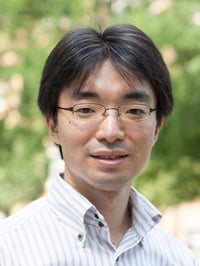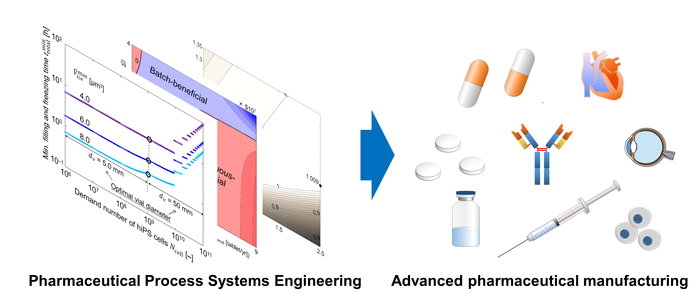Young Faculty / 030
Associate Professor Hirokazu Sugiyama, Department of Chemical System Engineering

<Biography>
Hirokazu Sugiyama studied chemical engineering at the University of Tokyo (BEng in 2001, MEng in 2003), and earned PhD from ETH Zurich (2007). Subsequently he joined F. Hoffmann-La Roche in Switzerland, and held different positions in a start-up facility of biological drug product manufacturing with increasing responsibilities. His last position was Head of Prefilled Syringe Production. In 2013 Dr. Sugiyama was appointed as an associate professor at the Department of Chemical System Engineering, Graduate School of Engineering, The University of Tokyo, and started research activities on the design and operation of pharmaceutical manufacturing processes.
<About the Research>
Pharmaceuticals are the industrial products that impact human lives directly. Conventionally, the majority has been small molecules that are produced by chemical syntheses, but the recent years saw a rapid market expansion of biopharmaceuticals such as monoclonal antibodies. Various recent developments include gene therapy and induced pluripotent stem (iPS) cells. There is a need for new methodologies that support such advancements in pharmaceutical manufacturing.
We are exploring the new field of “pharmaceutical process systems engineering”. By covering small molecules, biopharmaceuticals, and regenerative medicine products, we are developing methods for production process design and operation by fully utilizing modeling, simulation, and optimization technologies. The current topics are: process design using new technologies such as continuous manufacturing or single-use [1, 2], optimization of changeover operations that becomes critical in the trend of small-volume and multi-product production [3, 4], and data-driven operation support [5, 6]. Process design on iPS cell manufacturing has also become our topic [7, 8]. The research is conducted with both experimental and simulation approaches, by collaborating with domestic/overseas universities and companies that have experimental labs/commercial plants. Our interest is also on the industrial application by software implementation [9]. By thinking molecule/cells, processes, and the healthcare society in a multiscale manner, we develop methodologies that could not be achieved only by individual scale researches.

References
[1] K. Matsunami, et al., Ind. Eng. Chem. Res., 57, 9798–9809 (2018)
[2] H. Shirahata, et al., Comput. Chem. Eng., 122, 114–128 (2019)
[3] K. Yabuta, et al., Int. J. Pharm., 548, 466–473 (2018)
[4] A. Zeberli, et al., J. Pharm. Innov., in press
[5] G. Casola, et al., AIChE Journal, 64, 1272–1284 (2018)
[6] G. Casola, et al., Comput. Chem. Eng., 124, 253–269 (2019)
[7] H. Sugiyama, et al., Regen. Ther., in press
[8] Y. Hayashi, et al., Comput. Chem. Eng., 132, 106597 (2020)
[9] H. Shirahata, et al., Processes, 7, 448 (2019)
<Future aspirasions>
My passion is on the training of PhD students, and on the development of the laboratory environment beyond the hurdles of languages and background. So far, I have welcomed 7 PhD students with celebrating the first PhD commencement last year. Among the 7 accepted international students from Germany and Switzerland, 3 students (all from ETH Zurich) joined my laboratory later as PhD students. We are also sending students aboard using the opportunities of the official exchange and internship programs. My aspiration is to provide the visons on pharmaceutical manufacturing, and on the sustainable healthcare society, from The University of Tokyo to the world.
・Hirao-sugiyama Lab.: http://www.pse.t.u-tokyo.ac.jp/index_eng.html
・Press Releases, 18th July, 2019: http://www.t.u-tokyo.ac.jp/foee/press/setnws_201907181613408960155551.html
You May Also Like
These Related Stories


